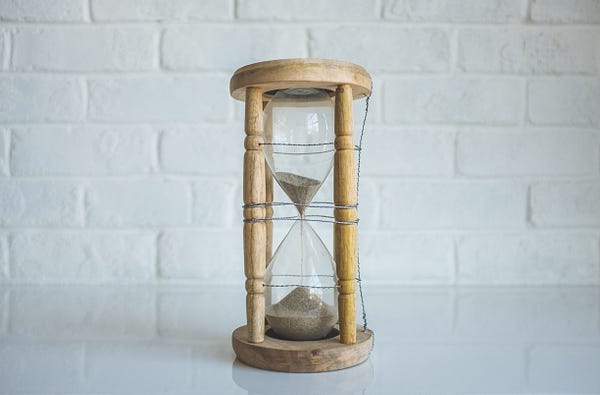“I don’t have time”

“I don’t have time”
I would argue that this is just perspective. We all might have time, but we all have different needs. Managing your priorities is the most important aspect of the impossible feat of managing time. Here is how I do this:
There are 52 weeks each year.
There are 168 hours each week.
There are 7 days each week.
There are 24 hours each day.
There are 1440 minutes each day.
How do we spend our time?
My time management begins at the top.
As I said, we all have different needs, I think that is obvious for everyone.
But what are our needs? How important are they?
That is only for us to decide.
So, my time management begins at the top. Here is what I mean by that…

I think about my daily needs and the things that I want to do each and every single day.
What are those things?
I think about my priorities first.
Each day, I need my prayer time in the morning, I need to write down my goals, I need to exercise, and I need to take a shower.
I know that every morning, no matter what, I need at least 40 minutes for those things, unless I’m going to the gym rather than just doing an ab workout.
The other things in my morning, like my personal journal containing a reflection on the day before, can happen at any point in the day, that does not always need to be first in the morning, though I prefer it to be.
Likewise, my shared devotional is preferred to be first in the morning, but it does not need to be.
That is the first part of my time management. I know that my next day will begin with me waking up. What will I be doing after I wake up?
Those are the non-negotiable things, the things that I require out of myself, each and every morning.
So, obviously, those are the things that I need to make sure I allocate time for, no matter what.
As I continue throughout the day, I think of things in the same way. I ask myself, “What are the most important things for me to do today?” (though I usually ask myself this question the night before so it’s really, “what are the most important things for me to do tomorrow?”).
So, there is another thing that I always make time for. I allocate or spend about 5–10 minutes thinking about my daily goals. The goals that I write down in the morning are my long-term goals.
I know that there are other things that I want to dedicate time to, such as reading 20 pages nightly and writing 3 pieces weekly.
But, as important as those two things are, they are not always the most urgent things.

Differentiating, as I have written about before on January 8, 2019, urgency and importance is extremely vital and is most important to me. Differentiating in this way is integral to the way that I manage my time throughout my day and throughout my week.
I always tend to think numerically, methodically, and strategically. That is how I am wired, and, how I like to be.
As you might know, I believe you can “evolve your brain” as Joe Dispenza writes about in his various books and other publications.
I know, for instance, that as an introvert now, I could evolve my brain and ultimately become more extraverted, but, I am happy to be an introvert.
As an aside, I am not generally a fan of when someone says something like,
“This is just how I’m wired.”
I say this because I believe that ultimately, we can always change and become whomever we want to be, as long as God empowers us to do so.
I like structure. I like planning.
Virtually my whole day is scheduled out. For the parts that aren’t scheduled, they are scheduled to be unscheduled.
I manage my time by focusing first on the things that need to get done and need to get done right away. Then, I think about what is most important.
If the urgent things take precedence over the important things, will that negatively affect the important things? If yes, how so?
That is the way that my mind works, and I like it that way.
I consider what I want to do most in my day, I consider what needs to get done most in the future, and then I consider what most needs to get done that day.
This does not and will not work for everyone. Some people are not so focused on logic, methods, and structure.

What I value most is that I do not need to use my (limited) willpower for decisions. When the average person is said to make over 25,000 decisions daily and research shows that human willpower is limited, I like to ensure that I can preserve my willpower for where it matters most.
I manage my time in an orderly way that allows me to focus on spending my time most effectively and efficiently.
“We can have more of everything in this world, but, we will never have more guaranteed time.”